Entrepreneurship & Small Business Management: Venture Performance
VerifiedAdded on 2023/02/01
|11
|2891
|45
Report
AI Summary
This report provides an overview of entrepreneurship and small business management, discussing various entrepreneurial ventures and highlighting the similarities and differences between them. It analyzes the impact of micro and small businesses, examining entrepreneurial personalities and their backgrounds, focusing on figures like Peter Jones and Bill Gates. The report delves into the characteristic skills and traits of successful entrepreneurs, such as innovative thinking, passion, time management, risk tolerance, and leadership. It also explores aspects of entrepreneurial personality, including openness, conscientiousness, extraversion, agreeableness, and neuroticism. Furthermore, the report discusses how background and experience can influence entrepreneurial performance, covering factors like education, family background, and social networks. The report concludes with recommendations for aspiring entrepreneurs, emphasizing financial stability, supportive relationships, relevant education, and patience, advocating for a well-rounded approach to venture creation and management.

Entrepreneurship and
Small Business
Management
Small Business
Management
Paraphrase This Document
Need a fresh take? Get an instant paraphrase of this document with our AI Paraphraser
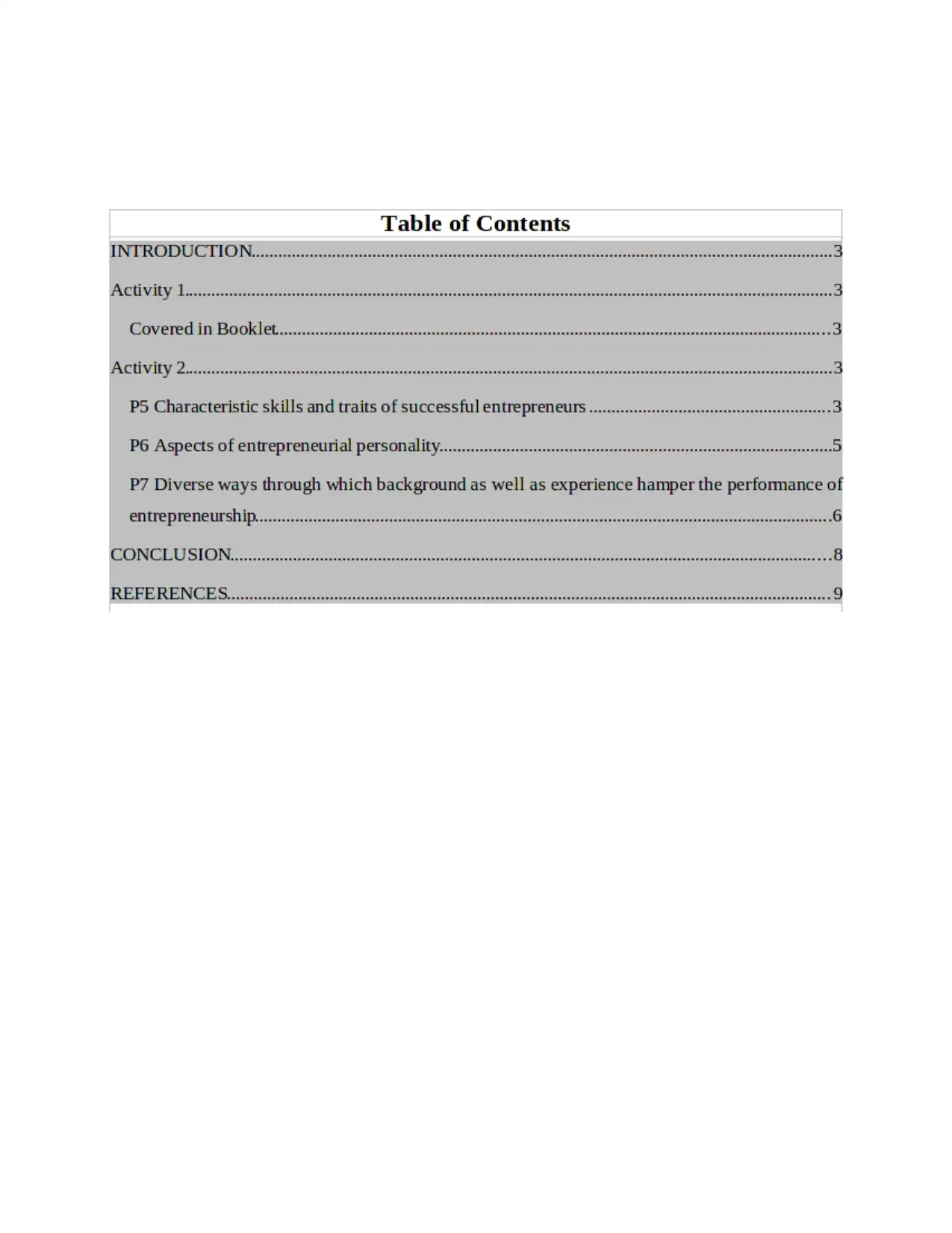

⊘ This is a preview!⊘
Do you want full access?
Subscribe today to unlock all pages.

Trusted by 1+ million students worldwide
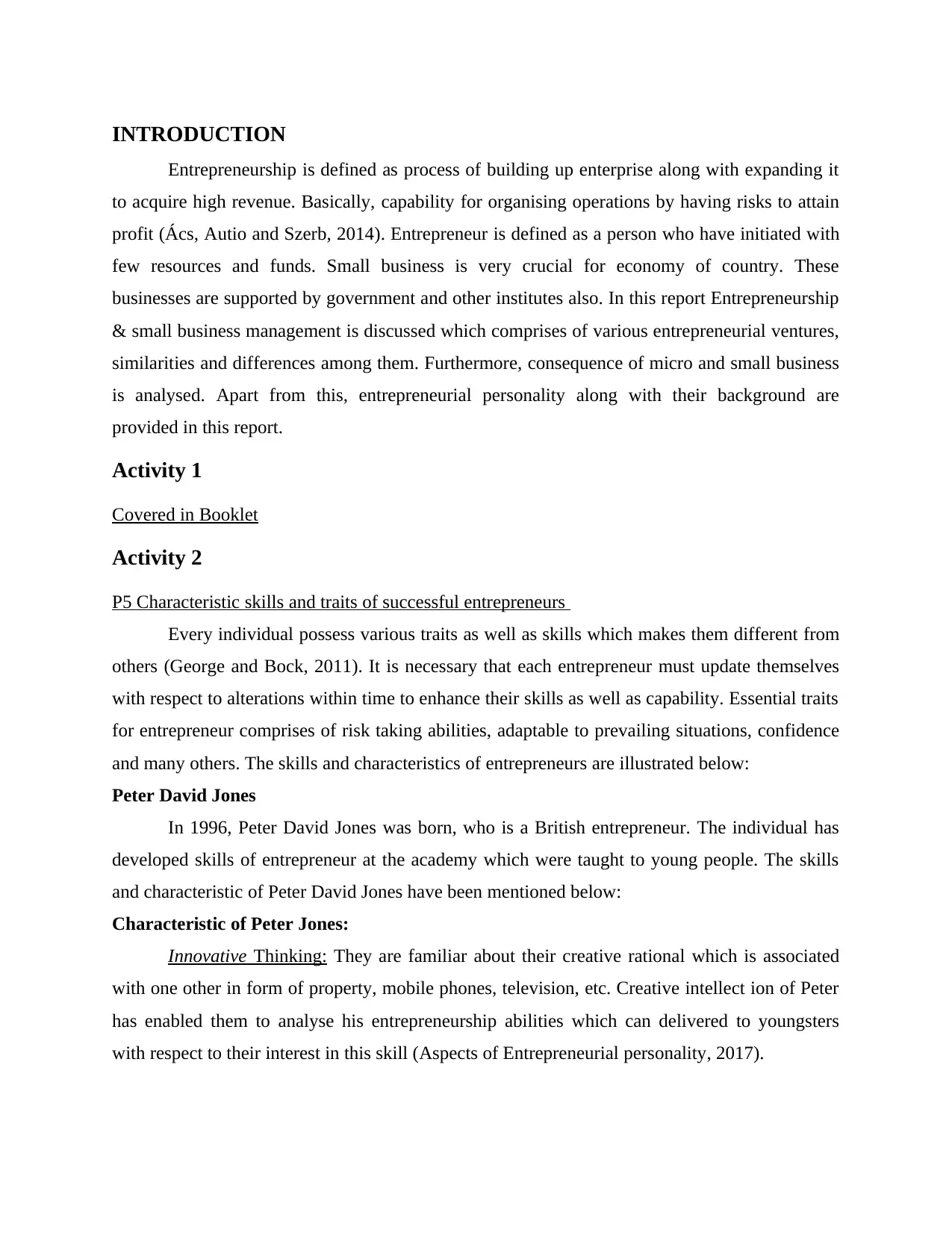
INTRODUCTION
Entrepreneurship is defined as process of building up enterprise along with expanding it
to acquire high revenue. Basically, capability for organising operations by having risks to attain
profit (Ács, Autio and Szerb, 2014). Entrepreneur is defined as a person who have initiated with
few resources and funds. Small business is very crucial for economy of country. These
businesses are supported by government and other institutes also. In this report Entrepreneurship
& small business management is discussed which comprises of various entrepreneurial ventures,
similarities and differences among them. Furthermore, consequence of micro and small business
is analysed. Apart from this, entrepreneurial personality along with their background are
provided in this report.
Activity 1
Covered in Booklet
Activity 2
P5 Characteristic skills and traits of successful entrepreneurs
Every individual possess various traits as well as skills which makes them different from
others (George and Bock, 2011). It is necessary that each entrepreneur must update themselves
with respect to alterations within time to enhance their skills as well as capability. Essential traits
for entrepreneur comprises of risk taking abilities, adaptable to prevailing situations, confidence
and many others. The skills and characteristics of entrepreneurs are illustrated below:
Peter David Jones
In 1996, Peter David Jones was born, who is a British entrepreneur. The individual has
developed skills of entrepreneur at the academy which were taught to young people. The skills
and characteristic of Peter David Jones have been mentioned below:
Characteristic of Peter Jones:
Innovative Thinking: They are familiar about their creative rational which is associated
with one other in form of property, mobile phones, television, etc. Creative intellect ion of Peter
has enabled them to analyse his entrepreneurship abilities which can delivered to youngsters
with respect to their interest in this skill (Aspects of Entrepreneurial personality, 2017).
Entrepreneurship is defined as process of building up enterprise along with expanding it
to acquire high revenue. Basically, capability for organising operations by having risks to attain
profit (Ács, Autio and Szerb, 2014). Entrepreneur is defined as a person who have initiated with
few resources and funds. Small business is very crucial for economy of country. These
businesses are supported by government and other institutes also. In this report Entrepreneurship
& small business management is discussed which comprises of various entrepreneurial ventures,
similarities and differences among them. Furthermore, consequence of micro and small business
is analysed. Apart from this, entrepreneurial personality along with their background are
provided in this report.
Activity 1
Covered in Booklet
Activity 2
P5 Characteristic skills and traits of successful entrepreneurs
Every individual possess various traits as well as skills which makes them different from
others (George and Bock, 2011). It is necessary that each entrepreneur must update themselves
with respect to alterations within time to enhance their skills as well as capability. Essential traits
for entrepreneur comprises of risk taking abilities, adaptable to prevailing situations, confidence
and many others. The skills and characteristics of entrepreneurs are illustrated below:
Peter David Jones
In 1996, Peter David Jones was born, who is a British entrepreneur. The individual has
developed skills of entrepreneur at the academy which were taught to young people. The skills
and characteristic of Peter David Jones have been mentioned below:
Characteristic of Peter Jones:
Innovative Thinking: They are familiar about their creative rational which is associated
with one other in form of property, mobile phones, television, etc. Creative intellect ion of Peter
has enabled them to analyse his entrepreneurship abilities which can delivered to youngsters
with respect to their interest in this skill (Aspects of Entrepreneurial personality, 2017).
Paraphrase This Document
Need a fresh take? Get an instant paraphrase of this document with our AI Paraphraser
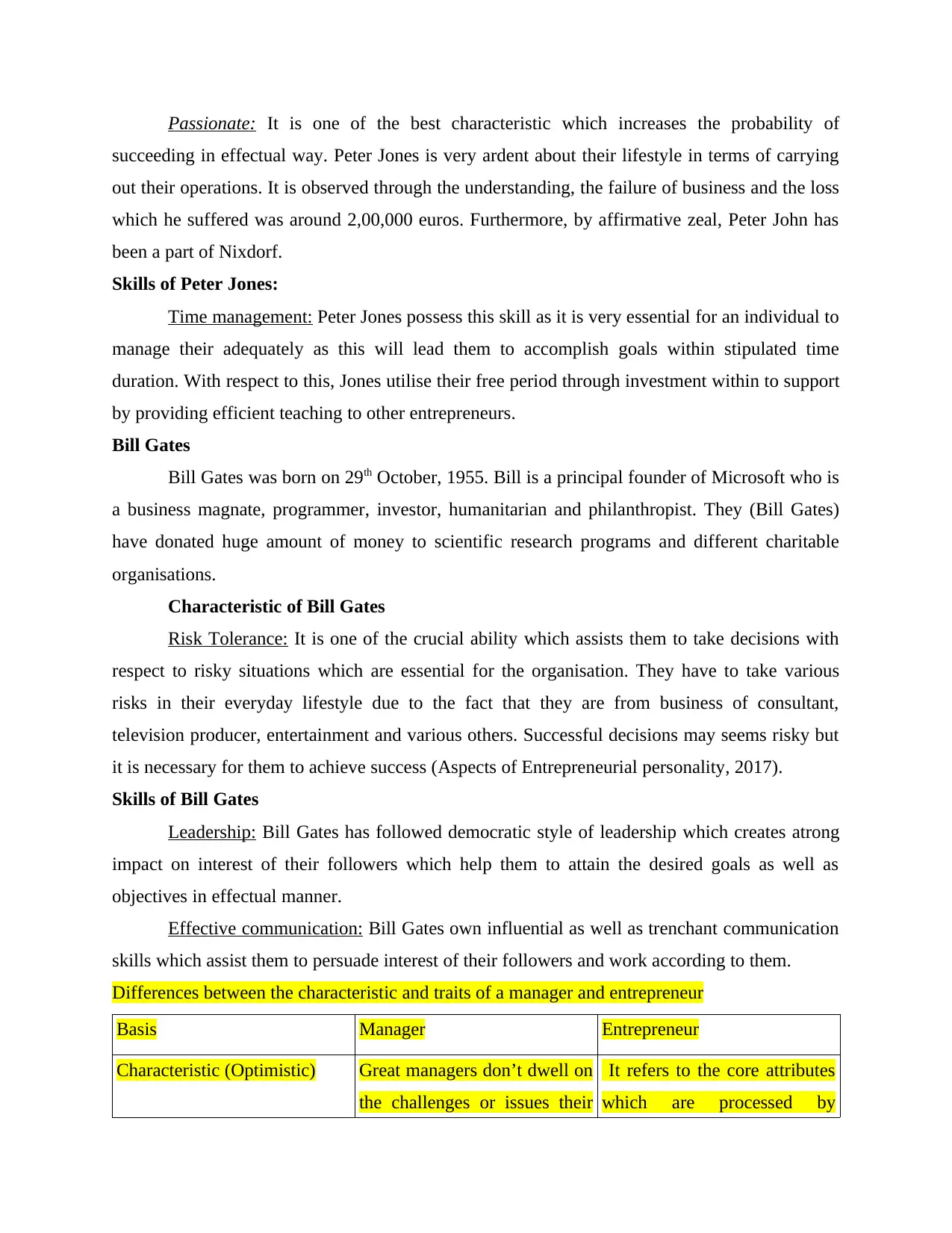
Passionate: It is one of the best characteristic which increases the probability of
succeeding in effectual way. Peter Jones is very ardent about their lifestyle in terms of carrying
out their operations. It is observed through the understanding, the failure of business and the loss
which he suffered was around 2,00,000 euros. Furthermore, by affirmative zeal, Peter John has
been a part of Nixdorf.
Skills of Peter Jones:
Time management: Peter Jones possess this skill as it is very essential for an individual to
manage their adequately as this will lead them to accomplish goals within stipulated time
duration. With respect to this, Jones utilise their free period through investment within to support
by providing efficient teaching to other entrepreneurs.
Bill Gates
Bill Gates was born on 29th October, 1955. Bill is a principal founder of Microsoft who is
a business magnate, programmer, investor, humanitarian and philanthropist. They (Bill Gates)
have donated huge amount of money to scientific research programs and different charitable
organisations.
Characteristic of Bill Gates
Risk Tolerance: It is one of the crucial ability which assists them to take decisions with
respect to risky situations which are essential for the organisation. They have to take various
risks in their everyday lifestyle due to the fact that they are from business of consultant,
television producer, entertainment and various others. Successful decisions may seems risky but
it is necessary for them to achieve success (Aspects of Entrepreneurial personality, 2017).
Skills of Bill Gates
Leadership: Bill Gates has followed democratic style of leadership which creates atrong
impact on interest of their followers which help them to attain the desired goals as well as
objectives in effectual manner.
Effective communication: Bill Gates own influential as well as trenchant communication
skills which assist them to persuade interest of their followers and work according to them.
Differences between the characteristic and traits of a manager and entrepreneur
Basis Manager Entrepreneur
Characteristic (Optimistic) Great managers don’t dwell on
the challenges or issues their
It refers to the core attributes
which are processed by
succeeding in effectual way. Peter Jones is very ardent about their lifestyle in terms of carrying
out their operations. It is observed through the understanding, the failure of business and the loss
which he suffered was around 2,00,000 euros. Furthermore, by affirmative zeal, Peter John has
been a part of Nixdorf.
Skills of Peter Jones:
Time management: Peter Jones possess this skill as it is very essential for an individual to
manage their adequately as this will lead them to accomplish goals within stipulated time
duration. With respect to this, Jones utilise their free period through investment within to support
by providing efficient teaching to other entrepreneurs.
Bill Gates
Bill Gates was born on 29th October, 1955. Bill is a principal founder of Microsoft who is
a business magnate, programmer, investor, humanitarian and philanthropist. They (Bill Gates)
have donated huge amount of money to scientific research programs and different charitable
organisations.
Characteristic of Bill Gates
Risk Tolerance: It is one of the crucial ability which assists them to take decisions with
respect to risky situations which are essential for the organisation. They have to take various
risks in their everyday lifestyle due to the fact that they are from business of consultant,
television producer, entertainment and various others. Successful decisions may seems risky but
it is necessary for them to achieve success (Aspects of Entrepreneurial personality, 2017).
Skills of Bill Gates
Leadership: Bill Gates has followed democratic style of leadership which creates atrong
impact on interest of their followers which help them to attain the desired goals as well as
objectives in effectual manner.
Effective communication: Bill Gates own influential as well as trenchant communication
skills which assist them to persuade interest of their followers and work according to them.
Differences between the characteristic and traits of a manager and entrepreneur
Basis Manager Entrepreneur
Characteristic (Optimistic) Great managers don’t dwell on
the challenges or issues their
It refers to the core attributes
which are processed by
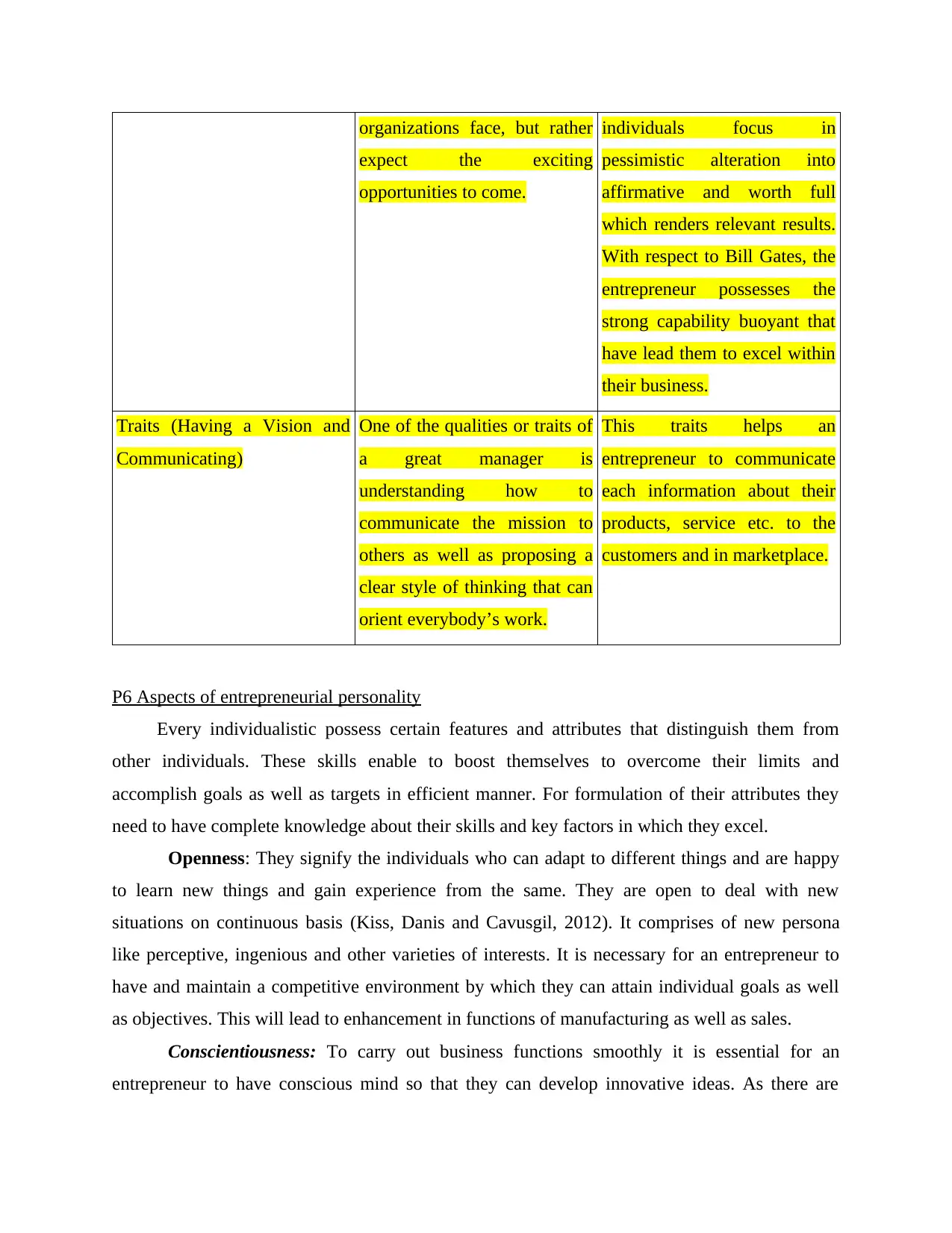
organizations face, but rather
expect the exciting
opportunities to come.
individuals focus in
pessimistic alteration into
affirmative and worth full
which renders relevant results.
With respect to Bill Gates, the
entrepreneur possesses the
strong capability buoyant that
have lead them to excel within
their business.
Traits (Having a Vision and
Communicating)
One of the qualities or traits of
a great manager is
understanding how to
communicate the mission to
others as well as proposing a
clear style of thinking that can
orient everybody’s work.
This traits helps an
entrepreneur to communicate
each information about their
products, service etc. to the
customers and in marketplace.
P6 Aspects of entrepreneurial personality
Every individualistic possess certain features and attributes that distinguish them from
other individuals. These skills enable to boost themselves to overcome their limits and
accomplish goals as well as targets in efficient manner. For formulation of their attributes they
need to have complete knowledge about their skills and key factors in which they excel.
Openness: They signify the individuals who can adapt to different things and are happy
to learn new things and gain experience from the same. They are open to deal with new
situations on continuous basis (Kiss, Danis and Cavusgil, 2012). It comprises of new persona
like perceptive, ingenious and other varieties of interests. It is necessary for an entrepreneur to
have and maintain a competitive environment by which they can attain individual goals as well
as objectives. This will lead to enhancement in functions of manufacturing as well as sales.
Conscientiousness: To carry out business functions smoothly it is essential for an
entrepreneur to have conscious mind so that they can develop innovative ideas. As there are
expect the exciting
opportunities to come.
individuals focus in
pessimistic alteration into
affirmative and worth full
which renders relevant results.
With respect to Bill Gates, the
entrepreneur possesses the
strong capability buoyant that
have lead them to excel within
their business.
Traits (Having a Vision and
Communicating)
One of the qualities or traits of
a great manager is
understanding how to
communicate the mission to
others as well as proposing a
clear style of thinking that can
orient everybody’s work.
This traits helps an
entrepreneur to communicate
each information about their
products, service etc. to the
customers and in marketplace.
P6 Aspects of entrepreneurial personality
Every individualistic possess certain features and attributes that distinguish them from
other individuals. These skills enable to boost themselves to overcome their limits and
accomplish goals as well as targets in efficient manner. For formulation of their attributes they
need to have complete knowledge about their skills and key factors in which they excel.
Openness: They signify the individuals who can adapt to different things and are happy
to learn new things and gain experience from the same. They are open to deal with new
situations on continuous basis (Kiss, Danis and Cavusgil, 2012). It comprises of new persona
like perceptive, ingenious and other varieties of interests. It is necessary for an entrepreneur to
have and maintain a competitive environment by which they can attain individual goals as well
as objectives. This will lead to enhancement in functions of manufacturing as well as sales.
Conscientiousness: To carry out business functions smoothly it is essential for an
entrepreneur to have conscious mind so that they can develop innovative ideas. As there are
⊘ This is a preview!⊘
Do you want full access?
Subscribe today to unlock all pages.

Trusted by 1+ million students worldwide
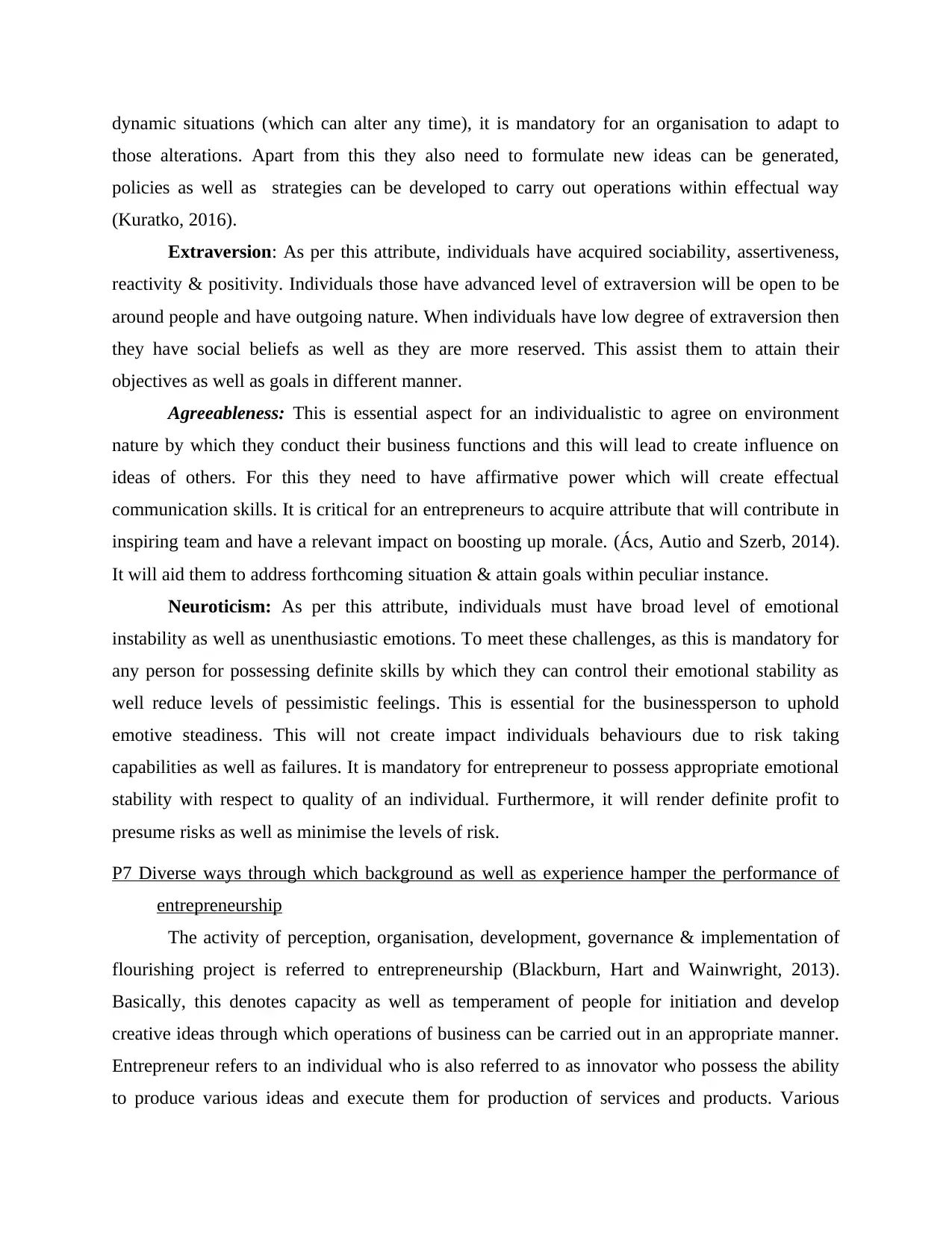
dynamic situations (which can alter any time), it is mandatory for an organisation to adapt to
those alterations. Apart from this they also need to formulate new ideas can be generated,
policies as well as strategies can be developed to carry out operations within effectual way
(Kuratko, 2016).
Extraversion: As per this attribute, individuals have acquired sociability, assertiveness,
reactivity & positivity. Individuals those have advanced level of extraversion will be open to be
around people and have outgoing nature. When individuals have low degree of extraversion then
they have social beliefs as well as they are more reserved. This assist them to attain their
objectives as well as goals in different manner.
Agreeableness: This is essential aspect for an individualistic to agree on environment
nature by which they conduct their business functions and this will lead to create influence on
ideas of others. For this they need to have affirmative power which will create effectual
communication skills. It is critical for an entrepreneurs to acquire attribute that will contribute in
inspiring team and have a relevant impact on boosting up morale. (Ács, Autio and Szerb, 2014).
It will aid them to address forthcoming situation & attain goals within peculiar instance.
Neuroticism: As per this attribute, individuals must have broad level of emotional
instability as well as unenthusiastic emotions. To meet these challenges, as this is mandatory for
any person for possessing definite skills by which they can control their emotional stability as
well reduce levels of pessimistic feelings. This is essential for the businessperson to uphold
emotive steadiness. This will not create impact individuals behaviours due to risk taking
capabilities as well as failures. It is mandatory for entrepreneur to possess appropriate emotional
stability with respect to quality of an individual. Furthermore, it will render definite profit to
presume risks as well as minimise the levels of risk.
P7 Diverse ways through which background as well as experience hamper the performance of
entrepreneurship
The activity of perception, organisation, development, governance & implementation of
flourishing project is referred to entrepreneurship (Blackburn, Hart and Wainwright, 2013).
Basically, this denotes capacity as well as temperament of people for initiation and develop
creative ideas through which operations of business can be carried out in an appropriate manner.
Entrepreneur refers to an individual who is also referred to as innovator who possess the ability
to produce various ideas and execute them for production of services and products. Various
those alterations. Apart from this they also need to formulate new ideas can be generated,
policies as well as strategies can be developed to carry out operations within effectual way
(Kuratko, 2016).
Extraversion: As per this attribute, individuals have acquired sociability, assertiveness,
reactivity & positivity. Individuals those have advanced level of extraversion will be open to be
around people and have outgoing nature. When individuals have low degree of extraversion then
they have social beliefs as well as they are more reserved. This assist them to attain their
objectives as well as goals in different manner.
Agreeableness: This is essential aspect for an individualistic to agree on environment
nature by which they conduct their business functions and this will lead to create influence on
ideas of others. For this they need to have affirmative power which will create effectual
communication skills. It is critical for an entrepreneurs to acquire attribute that will contribute in
inspiring team and have a relevant impact on boosting up morale. (Ács, Autio and Szerb, 2014).
It will aid them to address forthcoming situation & attain goals within peculiar instance.
Neuroticism: As per this attribute, individuals must have broad level of emotional
instability as well as unenthusiastic emotions. To meet these challenges, as this is mandatory for
any person for possessing definite skills by which they can control their emotional stability as
well reduce levels of pessimistic feelings. This is essential for the businessperson to uphold
emotive steadiness. This will not create impact individuals behaviours due to risk taking
capabilities as well as failures. It is mandatory for entrepreneur to possess appropriate emotional
stability with respect to quality of an individual. Furthermore, it will render definite profit to
presume risks as well as minimise the levels of risk.
P7 Diverse ways through which background as well as experience hamper the performance of
entrepreneurship
The activity of perception, organisation, development, governance & implementation of
flourishing project is referred to entrepreneurship (Blackburn, Hart and Wainwright, 2013).
Basically, this denotes capacity as well as temperament of people for initiation and develop
creative ideas through which operations of business can be carried out in an appropriate manner.
Entrepreneur refers to an individual who is also referred to as innovator who possess the ability
to produce various ideas and execute them for production of services and products. Various
Paraphrase This Document
Need a fresh take? Get an instant paraphrase of this document with our AI Paraphraser
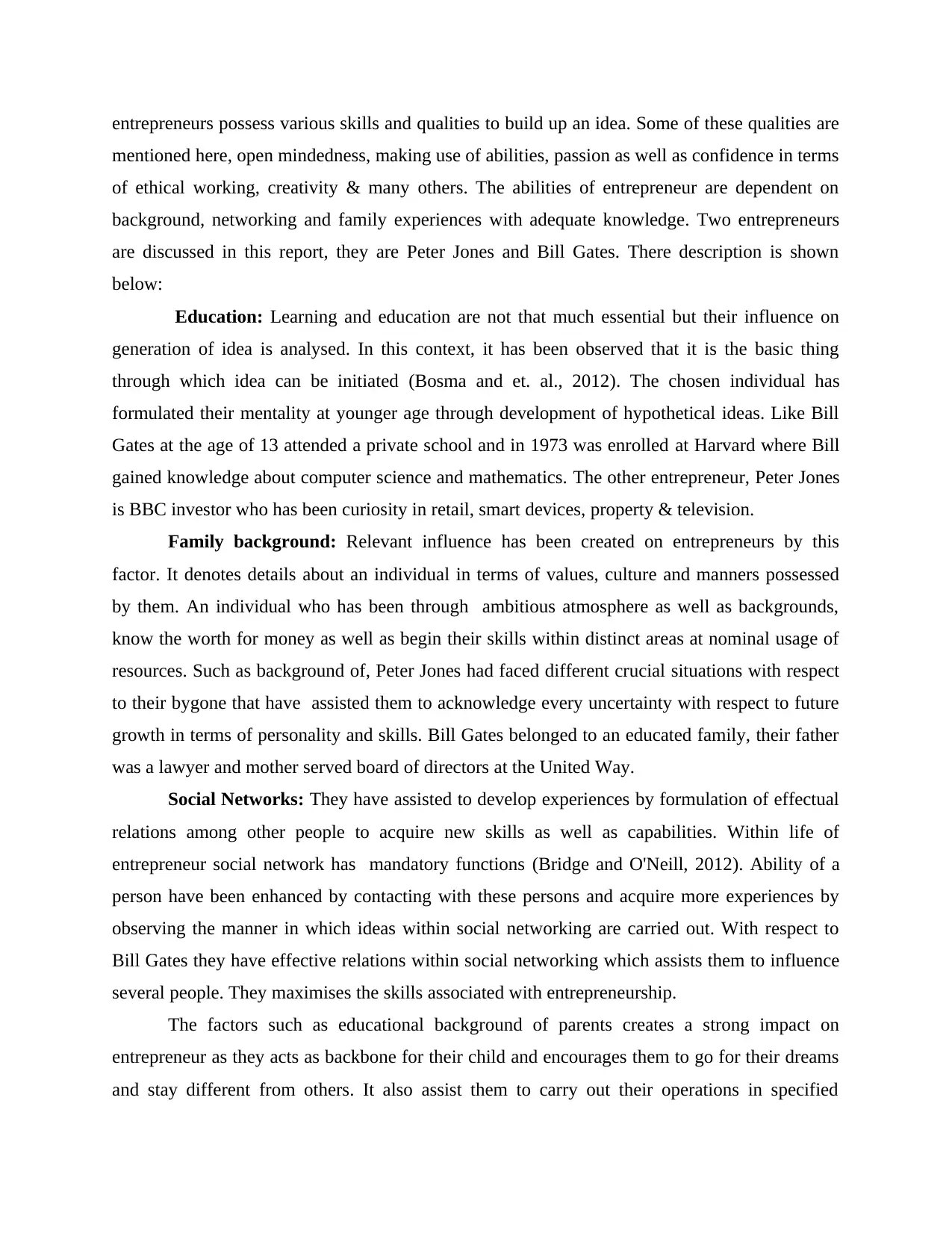
entrepreneurs possess various skills and qualities to build up an idea. Some of these qualities are
mentioned here, open mindedness, making use of abilities, passion as well as confidence in terms
of ethical working, creativity & many others. The abilities of entrepreneur are dependent on
background, networking and family experiences with adequate knowledge. Two entrepreneurs
are discussed in this report, they are Peter Jones and Bill Gates. There description is shown
below:
Education: Learning and education are not that much essential but their influence on
generation of idea is analysed. In this context, it has been observed that it is the basic thing
through which idea can be initiated (Bosma and et. al., 2012). The chosen individual has
formulated their mentality at younger age through development of hypothetical ideas. Like Bill
Gates at the age of 13 attended a private school and in 1973 was enrolled at Harvard where Bill
gained knowledge about computer science and mathematics. The other entrepreneur, Peter Jones
is BBC investor who has been curiosity in retail, smart devices, property & television.
Family background: Relevant influence has been created on entrepreneurs by this
factor. It denotes details about an individual in terms of values, culture and manners possessed
by them. An individual who has been through ambitious atmosphere as well as backgrounds,
know the worth for money as well as begin their skills within distinct areas at nominal usage of
resources. Such as background of, Peter Jones had faced different crucial situations with respect
to their bygone that have assisted them to acknowledge every uncertainty with respect to future
growth in terms of personality and skills. Bill Gates belonged to an educated family, their father
was a lawyer and mother served board of directors at the United Way.
Social Networks: They have assisted to develop experiences by formulation of effectual
relations among other people to acquire new skills as well as capabilities. Within life of
entrepreneur social network has mandatory functions (Bridge and O'Neill, 2012). Ability of a
person have been enhanced by contacting with these persons and acquire more experiences by
observing the manner in which ideas within social networking are carried out. With respect to
Bill Gates they have effective relations within social networking which assists them to influence
several people. They maximises the skills associated with entrepreneurship.
The factors such as educational background of parents creates a strong impact on
entrepreneur as they acts as backbone for their child and encourages them to go for their dreams
and stay different from others. It also assist them to carry out their operations in specified
mentioned here, open mindedness, making use of abilities, passion as well as confidence in terms
of ethical working, creativity & many others. The abilities of entrepreneur are dependent on
background, networking and family experiences with adequate knowledge. Two entrepreneurs
are discussed in this report, they are Peter Jones and Bill Gates. There description is shown
below:
Education: Learning and education are not that much essential but their influence on
generation of idea is analysed. In this context, it has been observed that it is the basic thing
through which idea can be initiated (Bosma and et. al., 2012). The chosen individual has
formulated their mentality at younger age through development of hypothetical ideas. Like Bill
Gates at the age of 13 attended a private school and in 1973 was enrolled at Harvard where Bill
gained knowledge about computer science and mathematics. The other entrepreneur, Peter Jones
is BBC investor who has been curiosity in retail, smart devices, property & television.
Family background: Relevant influence has been created on entrepreneurs by this
factor. It denotes details about an individual in terms of values, culture and manners possessed
by them. An individual who has been through ambitious atmosphere as well as backgrounds,
know the worth for money as well as begin their skills within distinct areas at nominal usage of
resources. Such as background of, Peter Jones had faced different crucial situations with respect
to their bygone that have assisted them to acknowledge every uncertainty with respect to future
growth in terms of personality and skills. Bill Gates belonged to an educated family, their father
was a lawyer and mother served board of directors at the United Way.
Social Networks: They have assisted to develop experiences by formulation of effectual
relations among other people to acquire new skills as well as capabilities. Within life of
entrepreneur social network has mandatory functions (Bridge and O'Neill, 2012). Ability of a
person have been enhanced by contacting with these persons and acquire more experiences by
observing the manner in which ideas within social networking are carried out. With respect to
Bill Gates they have effective relations within social networking which assists them to influence
several people. They maximises the skills associated with entrepreneurship.
The factors such as educational background of parents creates a strong impact on
entrepreneur as they acts as backbone for their child and encourages them to go for their dreams
and stay different from others. It also assist them to carry out their operations in specified
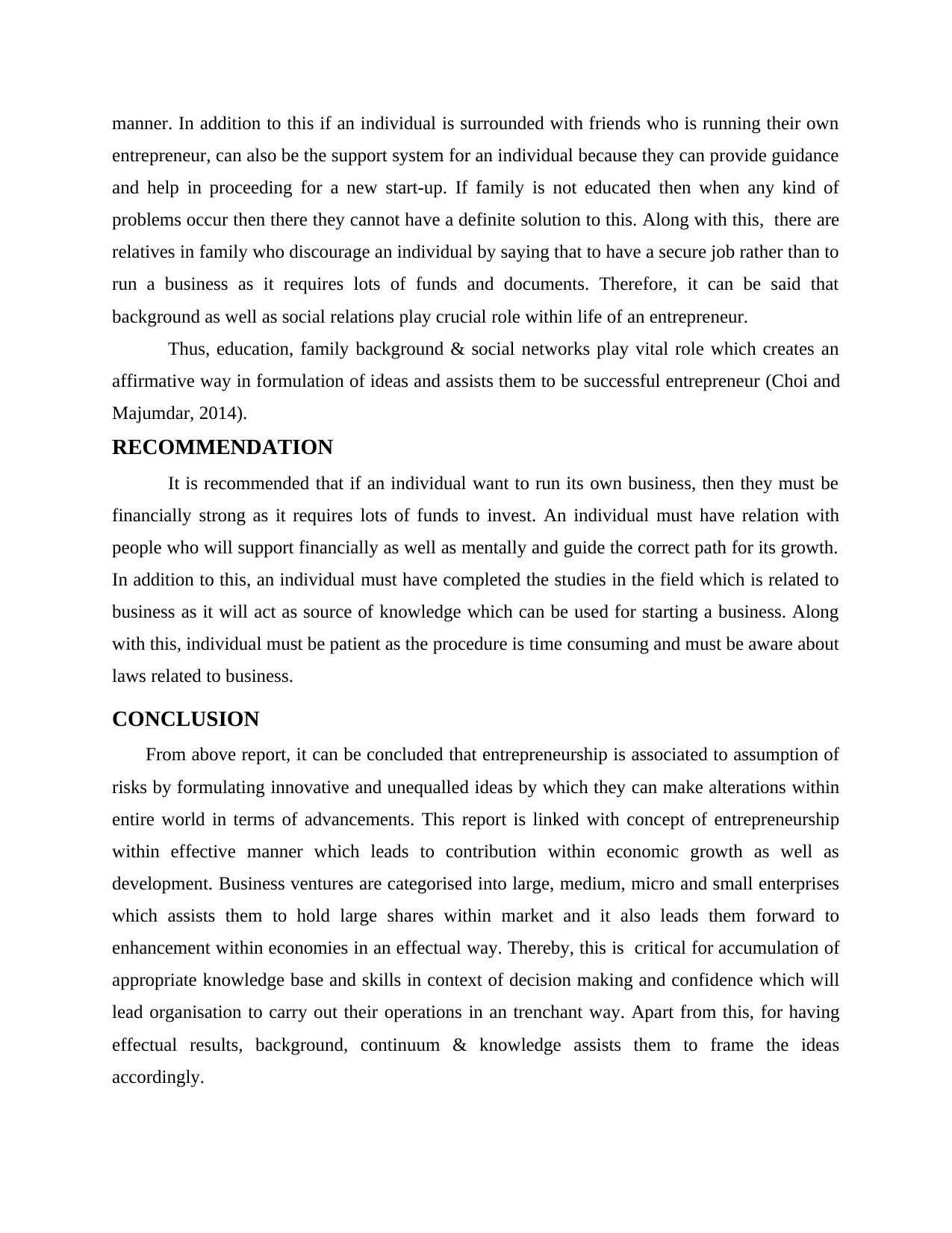
manner. In addition to this if an individual is surrounded with friends who is running their own
entrepreneur, can also be the support system for an individual because they can provide guidance
and help in proceeding for a new start-up. If family is not educated then when any kind of
problems occur then there they cannot have a definite solution to this. Along with this, there are
relatives in family who discourage an individual by saying that to have a secure job rather than to
run a business as it requires lots of funds and documents. Therefore, it can be said that
background as well as social relations play crucial role within life of an entrepreneur.
Thus, education, family background & social networks play vital role which creates an
affirmative way in formulation of ideas and assists them to be successful entrepreneur (Choi and
Majumdar, 2014).
RECOMMENDATION
It is recommended that if an individual want to run its own business, then they must be
financially strong as it requires lots of funds to invest. An individual must have relation with
people who will support financially as well as mentally and guide the correct path for its growth.
In addition to this, an individual must have completed the studies in the field which is related to
business as it will act as source of knowledge which can be used for starting a business. Along
with this, individual must be patient as the procedure is time consuming and must be aware about
laws related to business.
CONCLUSION
From above report, it can be concluded that entrepreneurship is associated to assumption of
risks by formulating innovative and unequalled ideas by which they can make alterations within
entire world in terms of advancements. This report is linked with concept of entrepreneurship
within effective manner which leads to contribution within economic growth as well as
development. Business ventures are categorised into large, medium, micro and small enterprises
which assists them to hold large shares within market and it also leads them forward to
enhancement within economies in an effectual way. Thereby, this is critical for accumulation of
appropriate knowledge base and skills in context of decision making and confidence which will
lead organisation to carry out their operations in an trenchant way. Apart from this, for having
effectual results, background, continuum & knowledge assists them to frame the ideas
accordingly.
entrepreneur, can also be the support system for an individual because they can provide guidance
and help in proceeding for a new start-up. If family is not educated then when any kind of
problems occur then there they cannot have a definite solution to this. Along with this, there are
relatives in family who discourage an individual by saying that to have a secure job rather than to
run a business as it requires lots of funds and documents. Therefore, it can be said that
background as well as social relations play crucial role within life of an entrepreneur.
Thus, education, family background & social networks play vital role which creates an
affirmative way in formulation of ideas and assists them to be successful entrepreneur (Choi and
Majumdar, 2014).
RECOMMENDATION
It is recommended that if an individual want to run its own business, then they must be
financially strong as it requires lots of funds to invest. An individual must have relation with
people who will support financially as well as mentally and guide the correct path for its growth.
In addition to this, an individual must have completed the studies in the field which is related to
business as it will act as source of knowledge which can be used for starting a business. Along
with this, individual must be patient as the procedure is time consuming and must be aware about
laws related to business.
CONCLUSION
From above report, it can be concluded that entrepreneurship is associated to assumption of
risks by formulating innovative and unequalled ideas by which they can make alterations within
entire world in terms of advancements. This report is linked with concept of entrepreneurship
within effective manner which leads to contribution within economic growth as well as
development. Business ventures are categorised into large, medium, micro and small enterprises
which assists them to hold large shares within market and it also leads them forward to
enhancement within economies in an effectual way. Thereby, this is critical for accumulation of
appropriate knowledge base and skills in context of decision making and confidence which will
lead organisation to carry out their operations in an trenchant way. Apart from this, for having
effectual results, background, continuum & knowledge assists them to frame the ideas
accordingly.
⊘ This is a preview!⊘
Do you want full access?
Subscribe today to unlock all pages.

Trusted by 1+ million students worldwide

It has been recommended that individuals who possess capabilities and skills must have
their own business by which ideas can be implemented in effectual way. Furthermore, they need
to take risks by which better and effectual results can be attained.
their own business by which ideas can be implemented in effectual way. Furthermore, they need
to take risks by which better and effectual results can be attained.
Paraphrase This Document
Need a fresh take? Get an instant paraphrase of this document with our AI Paraphraser
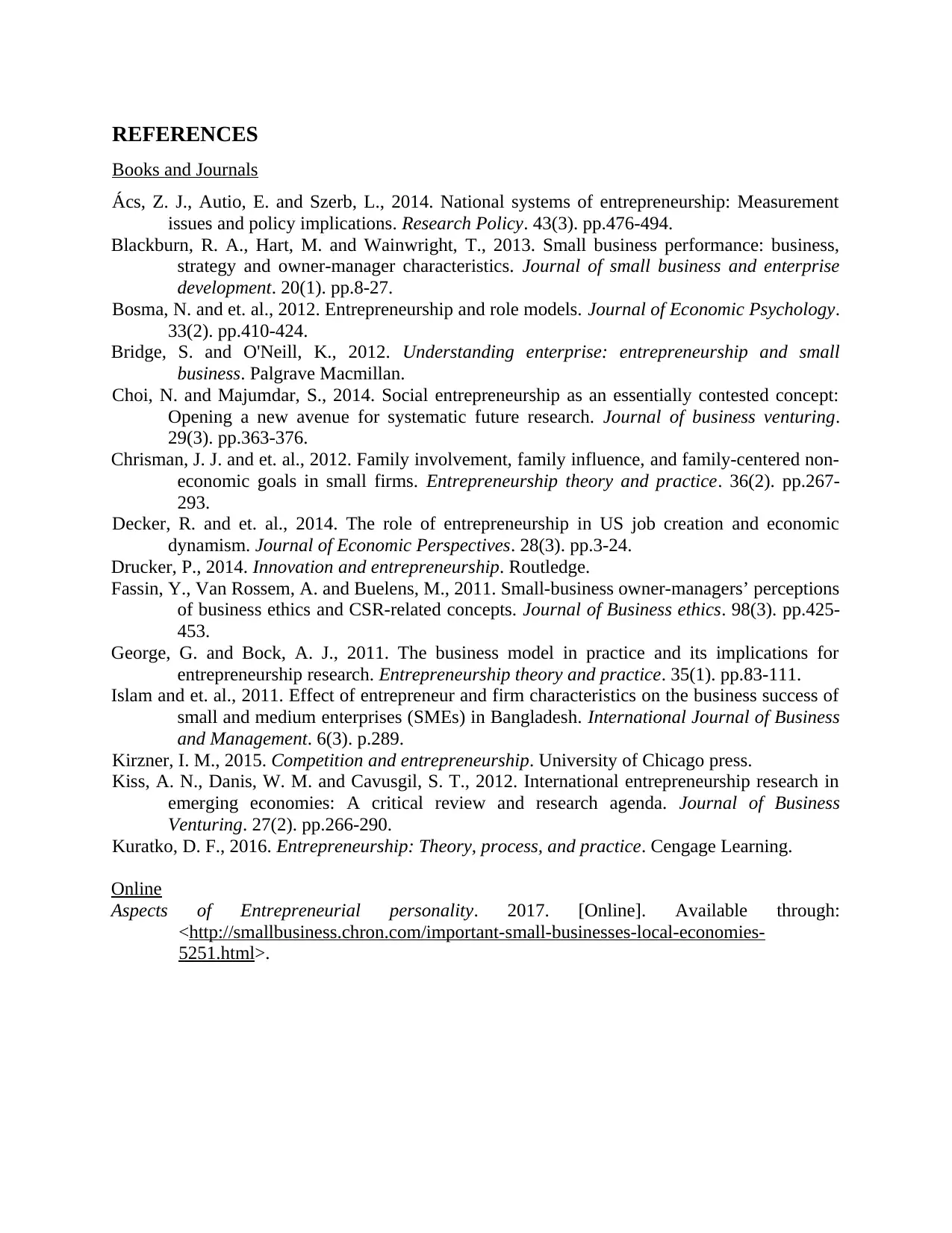
REFERENCES
Books and Journals
Ács, Z. J., Autio, E. and Szerb, L., 2014. National systems of entrepreneurship: Measurement
issues and policy implications. Research Policy. 43(3). pp.476-494.
Blackburn, R. A., Hart, M. and Wainwright, T., 2013. Small business performance: business,
strategy and owner-manager characteristics. Journal of small business and enterprise
development. 20(1). pp.8-27.
Bosma, N. and et. al., 2012. Entrepreneurship and role models. Journal of Economic Psychology.
33(2). pp.410-424.
Bridge, S. and O'Neill, K., 2012. Understanding enterprise: entrepreneurship and small
business. Palgrave Macmillan.
Choi, N. and Majumdar, S., 2014. Social entrepreneurship as an essentially contested concept:
Opening a new avenue for systematic future research. Journal of business venturing.
29(3). pp.363-376.
Chrisman, J. J. and et. al., 2012. Family involvement, family influence, and family‐centered non‐
economic goals in small firms. Entrepreneurship theory and practice. 36(2). pp.267-
293.
Decker, R. and et. al., 2014. The role of entrepreneurship in US job creation and economic
dynamism. Journal of Economic Perspectives. 28(3). pp.3-24.
Drucker, P., 2014. Innovation and entrepreneurship. Routledge.
Fassin, Y., Van Rossem, A. and Buelens, M., 2011. Small-business owner-managers’ perceptions
of business ethics and CSR-related concepts. Journal of Business ethics. 98(3). pp.425-
453.
George, G. and Bock, A. J., 2011. The business model in practice and its implications for
entrepreneurship research. Entrepreneurship theory and practice. 35(1). pp.83-111.
Islam and et. al., 2011. Effect of entrepreneur and firm characteristics on the business success of
small and medium enterprises (SMEs) in Bangladesh. International Journal of Business
and Management. 6(3). p.289.
Kirzner, I. M., 2015. Competition and entrepreneurship. University of Chicago press.
Kiss, A. N., Danis, W. M. and Cavusgil, S. T., 2012. International entrepreneurship research in
emerging economies: A critical review and research agenda. Journal of Business
Venturing. 27(2). pp.266-290.
Kuratko, D. F., 2016. Entrepreneurship: Theory, process, and practice. Cengage Learning.
Online
Aspects of Entrepreneurial personality. 2017. [Online]. Available through:
<http://smallbusiness.chron.com/important-small-businesses-local-economies-
5251.html>.
Books and Journals
Ács, Z. J., Autio, E. and Szerb, L., 2014. National systems of entrepreneurship: Measurement
issues and policy implications. Research Policy. 43(3). pp.476-494.
Blackburn, R. A., Hart, M. and Wainwright, T., 2013. Small business performance: business,
strategy and owner-manager characteristics. Journal of small business and enterprise
development. 20(1). pp.8-27.
Bosma, N. and et. al., 2012. Entrepreneurship and role models. Journal of Economic Psychology.
33(2). pp.410-424.
Bridge, S. and O'Neill, K., 2012. Understanding enterprise: entrepreneurship and small
business. Palgrave Macmillan.
Choi, N. and Majumdar, S., 2014. Social entrepreneurship as an essentially contested concept:
Opening a new avenue for systematic future research. Journal of business venturing.
29(3). pp.363-376.
Chrisman, J. J. and et. al., 2012. Family involvement, family influence, and family‐centered non‐
economic goals in small firms. Entrepreneurship theory and practice. 36(2). pp.267-
293.
Decker, R. and et. al., 2014. The role of entrepreneurship in US job creation and economic
dynamism. Journal of Economic Perspectives. 28(3). pp.3-24.
Drucker, P., 2014. Innovation and entrepreneurship. Routledge.
Fassin, Y., Van Rossem, A. and Buelens, M., 2011. Small-business owner-managers’ perceptions
of business ethics and CSR-related concepts. Journal of Business ethics. 98(3). pp.425-
453.
George, G. and Bock, A. J., 2011. The business model in practice and its implications for
entrepreneurship research. Entrepreneurship theory and practice. 35(1). pp.83-111.
Islam and et. al., 2011. Effect of entrepreneur and firm characteristics on the business success of
small and medium enterprises (SMEs) in Bangladesh. International Journal of Business
and Management. 6(3). p.289.
Kirzner, I. M., 2015. Competition and entrepreneurship. University of Chicago press.
Kiss, A. N., Danis, W. M. and Cavusgil, S. T., 2012. International entrepreneurship research in
emerging economies: A critical review and research agenda. Journal of Business
Venturing. 27(2). pp.266-290.
Kuratko, D. F., 2016. Entrepreneurship: Theory, process, and practice. Cengage Learning.
Online
Aspects of Entrepreneurial personality. 2017. [Online]. Available through:
<http://smallbusiness.chron.com/important-small-businesses-local-economies-
5251.html>.
1 out of 11
Related Documents
Your All-in-One AI-Powered Toolkit for Academic Success.
+13062052269
info@desklib.com
Available 24*7 on WhatsApp / Email
![[object Object]](/_next/static/media/star-bottom.7253800d.svg)
Unlock your academic potential
Copyright © 2020–2026 A2Z Services. All Rights Reserved. Developed and managed by ZUCOL.



